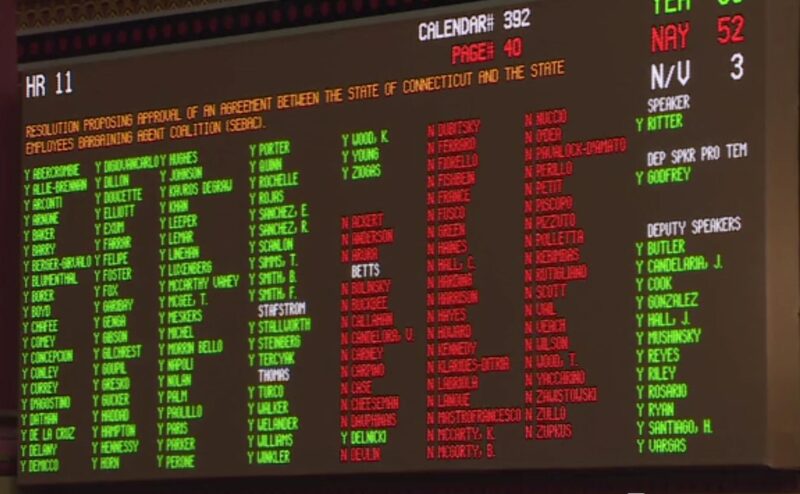House Approves $1.9B State Employee Raises, Bonuses Deal

UPDATE: The state Senate followed the state House and approved the state employee union wage increases and bonuses agreement on an April 22 22-13 party line vote.
The Connecticut House approved the $1.87 billion salary and bonus agreement between the Lamont administration and state employee unions April 21.
House lawmakers approved the agreement on a 96-52 party line vote following a four-hour debate. The state Senate is expected to follow suit when it acts April 22.
The State Employees Bargaining Agent Coalition contract revisions cover 46,237 state employees represented by 35 different collective bargaining unions. The agreement includes:
- 2.5% general wage increases in each of fiscal years 2022, 2023, and 2024.
- One lump sum payment retroactive to 2021 with full-time employees receiving $2,500 and part-time employees receiving a prorated amount
- $1,000 lump sum payment effective fiscal 2023 and prorated for part-time employees
- Agreement to reopen wage negotiations in fiscal 2025
Taxpayer Cost
CBIA opposed the contract agreement, citing looming state deficits and “the extraordinary cost to taxpayers.”
The Office of Fiscal Analysis projects state budget deficits of $931.9 million in fiscal 2024, $670.3 million in fiscal 2025, and $326.6 million in fiscal 2026.
“As we approach these significant budget deficits, increasing recurring costs will not lead to a structurally sound budget and financial predictability when federal pandemic funding ends,” CBIA president and CEO Chris DiPentima said.
“CBIA acknowledges the need for the state to recruit top talent to ensure continuation of services as the silver tsunami results in a brain drain of the state’s workforce which may come at an increased cost.
Connecticut faces budget deficits of $931.9 million in fiscal 2024, $670.3 million in fiscal 2025, and $326.6 million in fiscal 2026.
“However, using current surpluses bolstered by federal funding to provide one time bonuses for individuals who have announced their retirement by June 30, 2022 is counterproductive to this mission.
“The state should be using these funds to recruit future employees or continue the progress we have made paying down our current long-term pension obligations.”
DiPentima said that the state’s labor shortage crisis and fragile economy requires that government invest surplus budget funds and federal pandemic relief dollars to support the state’s economic recovery.
“Let’s make investments in our economic recovery through meaningful workforce development programs, paying down the Unemployment Trust Fund debt, and thoughtful investments in technology to streamline state services,” he said.
‘Missed Opportunity’
He added that the agreement “also misses the opportunity to adopt long-term initiatives to streamline and modernize state government operations.”
The administration’s CREATES Report identified 200 opportunities to reform state government, realizing between $600 million and $900 million in annual taxpayer savings.
Those recommendations included improving hiring processes, better managing overtime, absenteeism, and workers’ compensation, further centralizing shared services, and leveraging technology to improve service delivery.
“Connecticut will lose a major opportunity to streamline state government if the CREATES Report is relegated to some dusty shelf.”
CBIA’s Chris DiPentima
The report did identify areas where staffing levels needed boosting, such as the state police and Department of Correction, while supporting work rule restriction reforms, addressing the $100 million in annual workers’ compensation claims, and curbing overtime costs, on track to hit a record $284 million this year.
“The report’s recommendations represent a detailed blueprint for reimagining the way state government operates and for delivering greater taxpayer value to Connecticut residents and employers,” DiPentima said.
“Connecticut will lose a major opportunity to streamline state government and improve taxpayer ROI if the CREATES Report is relegated to some dusty shelf.
“Unfortunately, this SEBAC contract will continue to crowd out funding for other meaningful policies and programs and only add to state taxpayers’ liability.”
For more information, contact CBIA’s Ashley Zane (860.244.1169) | @AshleyZane9
RELATED
EXPLORE BY CATEGORY
Stay Connected with CBIA News Digests
The latest news and information delivered directly to your inbox.



